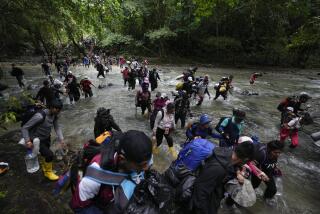Blockade Idea Floated on Troubled Waters : Cuba: Calls for tough action to halt refugees are sounded. But strategists see many pitfalls, including added pressure on Cubans to leave island.
- Share via
WASHINGTON — Military strategists said Monday that there probably is only one effective way to stop the flow of refugees from Cuba: Impose a naval blockade around the island and stop all vessels and aircraft that might be carrying would-be immigrants.
A blockade worked in Cuba in 1962, when the United States “quarantined” the island to prevent further delivery of Soviet missiles to the regime of Fidel Castro. It has generally worked to embargo trade in Bosnia, Iraq and Haiti.
And now some officials and Cuban American leaders are calling for a blockade around present-day Cuba as well--not only to stop boat people headed for the United States but also perhaps to seal off the island from any trade.
Leon E. Panetta, the White House chief of staff, even raised the idea on a national television interview program on Sunday.
But the mere suggestion sends chills through the ranks of those who would have to set up and operate the blockade and among policy-makers who, having failed to improve the situation with their own solutions, still think that an embargo could make it worse.
Skeptics said a blockade would require a massive effort that would take warships away from military operations around Haiti. It might even backfire, they said, by worsening conditions in Cuba so much that more Cubans would try to flee, thus straining U.S. detention facilities.
Under international law, it also might be considered an act of war--possibly prompting Castro to launch a last-ditch military stand that could put ordinary Cubans at risk and draw the United States into a tense military confrontation.
Indeed, despite Panetta’s remarks, the Administration was quickly backing away from the idea Monday. “That’s not part of our present planning,” Defense Secretary William J. Perry said at a press conference in Key West.
In truth, the Administration already has imposed something of a blockade. The Navy announced Monday that it has deployed several more warships to help Coast Guard vessels pick up refugees. The two services have set up a picket line spanning the Florida Straits.
But naval warfare experts said an expansion of that effort--perhaps to a total economic embargo--would require as many as 50 warships and dozens of aircraft, siphoning them away from operations in Haiti, drug enforcement duties and other assigned tasks.
“It would be a major naval undertaking,” said retired Navy Rear Adm. Eugene Carroll Jr., director of the Center for Defense Information, a liberal-oriented defense monitoring group. “We’d have to use practically everything we could scrape up on short notice.”
In essence, Carroll and other military analysts said, the blockade would be run as an extension of the current picket line. U.S. warplanes and ships would search for Cuban rafters and for any vessels and aircraft bound to or from Cuba.
They would stop them, demand that they identify their passengers and cargo, and force them to alter course. Militarily, the operation would be relatively straightforward, Carroll asserted.
But military analysts said that imposing a naval blockade would be costly and fraught with other difficulties that together raise serious doubts about the wisdom of such an operation. Among the problems:
* Although blocking the shipment of crucial imports, such as petroleum, undoubtedly would hurt Cuba’s economy, experts said that it also could intensify pressures for more Cubans to want to leave the island, exacerbating the refugee problem for the United States.
“The risk is that they’d be creating the same sort of problem in Cuba that has resulted in Haiti--that the embargo creates such pressure on the economy that people will want to leave all the more, said Dan Goure, analyst for the Center for Strategic and International Studies, a middle-of-the-road Washington think tank.
“It didn’t work the first time, so why would you want to repeat it?” Goure said. “They’d be buying themselves an explosion--and nobody wants that.”
* If the flow of refugees from Cuba increases markedly, the United States would have difficulty in detaining and housing them. The refugee compounds at the U.S. naval base at Guantanamo Bay, Cuba, already are nearly full, and other countries are proving slow to offer help.
Moreover, some critics fear that, unless Castro agrees soon to take back the refugees who are being held at Guantanamo Bay, the United States could be in the embarrassing position of appearing to operate long-term detention camps--a black eye for any democracy.
* While U.S. vessels are unlikely to face any serious challenge, there still is the chance that U.S. warships or planes might have to fire on a third country’s vessels or aircraft, setting off a diplomatic incident.
Under the terms that the Administration already has set for similar blockades in Haiti, Bosnia and Iraq, the only way to give the operation legitimacy would be to seek a mandate from the United Nations Security Council.
But policy analysts cautioned that winning such approval likely would prove difficult, since the issue is regarded primarily as a regional problem that some countries, such as China, may not be willing to help resolve.
“It’s a much tougher kind of deal,” Goure said.
The 1962 naval blockade during the Cuban missile crisis was aimed almost solely at stopping Soviet ships from delivering missiles to the Castro regime. The United States used dozens of warships, including eight aircraft carriers and hundreds of aircraft. It lasted six days.
But military experts said that blockading Cuba now would be closer in size and scope to the naval embargoes that are in force outside Bosnia, Iraq and Haiti, involving ship-by-ship interdiction.
More to Read
Sign up for Essential California
The most important California stories and recommendations in your inbox every morning.
You may occasionally receive promotional content from the Los Angeles Times.













